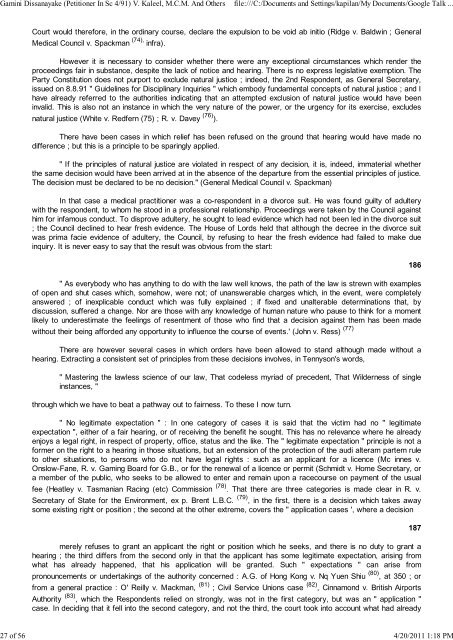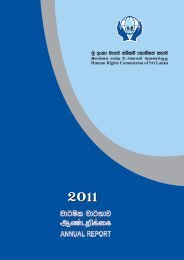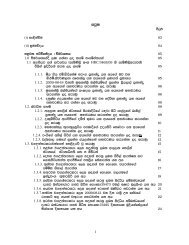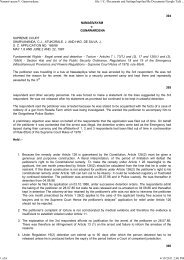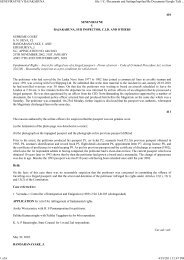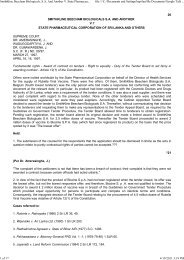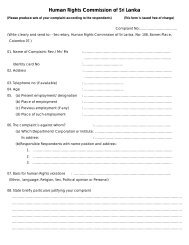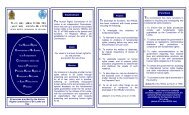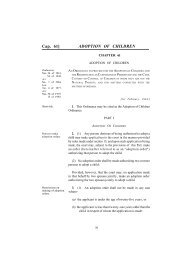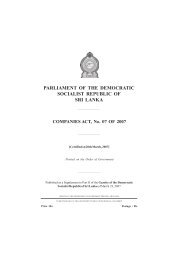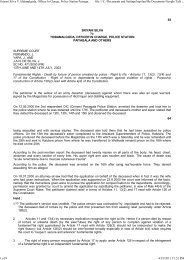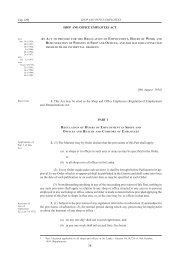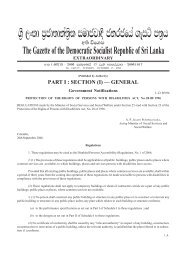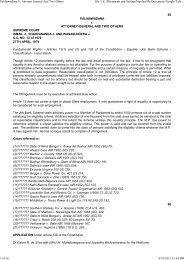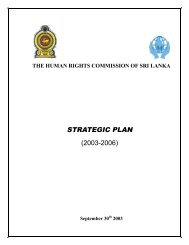Gamini Dissanayake (Petitio... - Human Rights Commission of Sri ...
Gamini Dissanayake (Petitio... - Human Rights Commission of Sri ...
Gamini Dissanayake (Petitio... - Human Rights Commission of Sri ...
You also want an ePaper? Increase the reach of your titles
YUMPU automatically turns print PDFs into web optimized ePapers that Google loves.
<strong>Gamini</strong> <strong>Dissanayake</strong> (<strong>Petitio</strong>ner In Sc 4/91) V. Kaleel, M.C.M. And Others file:///C:/Documents and Settings/kapilan/My Documents/Google Talk ...<br />
Court would therefore, in the ordinary course, declare the expulsion to be void ab initio (Ridge v. Baldwin ; General<br />
Medical Council v. Spackman (74), infra).<br />
However it is necessary to consider whether there were any exceptional circumstances which render the<br />
proceedings fair in substance, despite the lack <strong>of</strong> notice and hearing. There is no express legislative exemption. The<br />
Party Constitution does not purport to exclude natural justice ; indeed, the 2nd Respondent, as General Secretary,<br />
issued on 8.8.91 " Guidelines for Disciplinary Inquiries " which embody fundamental concepts <strong>of</strong> natural justice ; and I<br />
have already referred to the authorities indicating that an attempted exclusion <strong>of</strong> natural justice would have been<br />
invalid. This is also not an instance in which the very nature <strong>of</strong> the power, or the urgency for its exercise, excludes<br />
natural justice (White v. Redfern (75) ; R. v. Davey (76) ).<br />
There have been cases in which relief has been refused on the ground that hearing would have made no<br />
difference ; but this is a principle to be sparingly applied.<br />
" If the principles <strong>of</strong> natural justice are violated in respect <strong>of</strong> any decision, it is, indeed, immaterial whether<br />
the same decision would have been arrived at in the absence <strong>of</strong> the departure from the essential principles <strong>of</strong> justice.<br />
The decision must be declared to be no decision." (General Medical Council v. Spackman)<br />
In that case a medical practitioner was a co-respondent in a divorce suit. He was found guilty <strong>of</strong> adultery<br />
with the respondent, to whom he stood in a pr<strong>of</strong>essional relationship. Proceedings were taken by the Council against<br />
him for infamous conduct. To disprove adultery, he sought to lead evidence which had not been led in the divorce suit<br />
; the Council declined to hear fresh evidence. The House <strong>of</strong> Lords held that although the decree in the divorce suit<br />
was prima facie evidence <strong>of</strong> adultery, the Council, by refusing to hear the fresh evidence had failed to make due<br />
inquiry. It is never easy to say that the result was obvious from the start:<br />
" As everybody who has anything to do with the law well knows, the path <strong>of</strong> the law is strewn with examples<br />
<strong>of</strong> open and shut cases which, somehow, were not; <strong>of</strong> unanswerable charges which, in the event, were completely<br />
answered ; <strong>of</strong> inexplicable conduct which was fully explained ; if fixed and unalterable determinations that, by<br />
discussion, suffered a change. Nor are those with any knowledge <strong>of</strong> human nature who pause to think for a moment<br />
likely to underestimate the feelings <strong>of</strong> resentment <strong>of</strong> those who find that a decision against them has been made<br />
without their being afforded any opportunity to influence the course <strong>of</strong> events.' (John v. Ress) (77)<br />
There are however several cases in which orders have been allowed to stand although made without a<br />
hearing. Extracting a consistent set <strong>of</strong> principles from these decisions involves, in Tennyson's words,<br />
" Mastering the lawless science <strong>of</strong> our law, That codeless myriad <strong>of</strong> precedent, That Wilderness <strong>of</strong> single<br />
instances, "<br />
through which we have to beat a pathway out to fairness. To these I now turn.<br />
" No legitimate expectation " : In one category <strong>of</strong> cases it is said that the victim had no " legitimate<br />
expectation ", either <strong>of</strong> a fair hearing, or <strong>of</strong> receiving the benefit he sought. This has no relevance where he already<br />
enjoys a legal right, in respect <strong>of</strong> property, <strong>of</strong>fice, status and the like. The " legitimate expectation " principle is not a<br />
former on the right to a hearing in those situations, but an extension <strong>of</strong> the protection <strong>of</strong> the audi alteram partem rule<br />
to other situations, to persons who do not have legal rights : such as an applicant for a licence (Mc innes v.<br />
Onslow-Fane, R. v. Gaming Board for G.B., or for the renewal <strong>of</strong> a licence or permit (Schmidt v. Home Secretary, or<br />
a member <strong>of</strong> the public, who seeks to be allowed to enter and remain upon a racecourse on payment <strong>of</strong> the usual<br />
fee (Heatley v. Tasmanian Racing (etc) <strong>Commission</strong> (78) . That there are three categories is made clear in R. v.<br />
Secretary <strong>of</strong> State for the Environment, ex p. Brent L.B.C. (79) , in the first, there is a decision which takes away<br />
some existing right or position ; the second at the other extreme, covers the " application cases ', where a decision<br />
merely refuses to grant an applicant the right or position which he seeks, and there is no duty to grant a<br />
hearing ; the third differs from the second only in that the applicant has some legitimate expectation, arising from<br />
what has already happened, that his application will be granted. Such " expectations " can arise from<br />
pronouncements or undertakings <strong>of</strong> the authority concerned : A.G. <strong>of</strong> Hong Kong v. Nq Yuen Shiu (80) , at 350 ; or<br />
from a general practice : O' Reilly v. Mackman, (81) ; Civil Service Unions case (82) , Cinnamond v. British Airports<br />
Authority (83) , which the Respondents relied on strongly, was not in the first category, but was an " application "<br />
case. In deciding that it fell into the second category, and not the third, the court took into account what had already<br />
27 <strong>of</strong> 56 4/20/2011 1:18 PM<br />
186<br />
187


